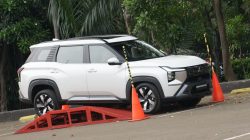The state’s pickup trade-in scheme is expected to help stimulate domestic pickup sales, which have been plummeting as the automotive sector slows, says the Federation of Thai Industries (FTI).
From January to May, sales of pure pickups fell by 17% year-on-year to 62,467 vehicles, attributed mainly to banks and car financing companies’ strict criteria to grant auto loans as a result of the high level of household debt.
“We support the trade-in programme for pickups. It should increase sales by 50,000-100,000 vehicles,” said Surapong Paisitpatanapong, vice-chairman of the FTI and spokesman for its Automotive Industry Club.
“In fact, it would be better if the government extends this measure to cover passenger cars too.”
There are 2 million registered vehicles that have been used for up to 20 years, according to the FTI club. If authorities consider applying the trade-in programme to other types of ageing cars used for between 5-8 years, that will cause the stagnant car market to significantly recover, according to the FTI.
The Finance Ministry pitched a trade-in concept — exchanging old pickups for new ones — with the government offering tax incentives to encourage participation.
Speaking on Monday, Finance Minister Pichai Chunhavajira said removing old vehicles from the roads could support the automotive industry by boosting new car sales.
According to Mr Pichai, at this initial stage, the idea is to allow owners to trade in old vehicles for new ones, with the government providing a tax reduction on new vehicle purchases.
The proposed measure targets pickups that are 20-25 years old. If the vehicle owner wants to buy a new pickup, they can trade in their old one and the government will reduce the excise tax rate on the new pickup, aiming to attract participants.
In addition to the tax reduction, the Finance Ministry plans to ask the Thai Credit Guarantee Corporation to provide credit guarantees for auto loans, he said.
Mr Surapong suggested the government set up a 5-billion-baht fund for credit guarantees.
“The fund would make lenders more likely to approve loans,” he said.
In May, Thailand’s car manufacturing increased by 10.3% year-on-year to 139,186 units for the first time in 21 months, driven by more production of battery electric vehicles, plug-in hybrid EVs and pickup passenger vehicles.
The domestic car market remained sluggish during the first five months of this year, with sales falling by nearly 3% to 252,615 units.
In May, car exports rose by 23% to 81,071 vehicles, thanks to more purchase orders of pickups and hybrid EVs from Australia and the Middle East.
Provided by SyndiGate Media Inc. (
Syndigate.info
).







